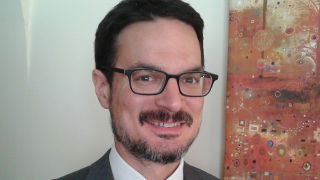Education Faculty’s Research Publications Promote Inclusive Representation in Language Classrooms
Tuesday, April 21, 2020

Now in his faculty work at Seton Hall University, Dr. Meadows places this question at the center of his ongoing research agenda. In three recent peer-reviewed publications, he provides language teachers theoretical concepts and practical techniques they can use in their classrooms to make their culture teaching more inclusive. In the conceptual article, "Legitimate Pluralities: Preparing Future Language Educators to View National Culture(s) through an Inclusive Lens," Dr. Meadows provides future language teachers with guidance on how and why to adopt an inclusive mindset in how they represent national cultures. In short, the concept of "Legitimate Pluralities" provides the principled rationale for teachers to represent to students the plurality of ways individuals identify with a national culture — all equally legitimate and authentic in their own way. This article appears in Multicultural Perspectives, the official journal of the National Association for Education (NAME).
In two additional publications, Dr. Meadows examines the decision-making of language teachers in multiple locations within the United States and beyond (e.g., Serbia, France, Saudi Arabia, and Iran). In the original research article, "National Narratives in Language Classrooms: Documenting Mezzo-Spaces between the Macro and Micro of National Reproduction," Dr. Meadows poses to 195 language teachers the central question to his research agenda: What representations do you select when teaching language students about a national culture? In the teacher survey responses, Dr. Meadows identified 15 categories of representations, prominent among them was national holidays/rituals. He uses the concept of the National Narrative to draw teacher attention to the collection of representations possible for any given national culture, and by extension, the teacher's agentive role in taking students beyond the pitfalls of national stereotypes and generalizations. This article appears in the International Journal of Applied Linguistics, published by Wiley in cooperation with the International Association of Applied Linguistics.
In a follow-up original research article, "Nationalism, Nationalized Cultures, and English Language Teaching (ELT): What Teacher Interviews Reveal about Culture Teaching as Vehicle for Ideological Reproduction/Transformation," Dr. Meadows reports the results of in-depth interviews with 11 language teachers. In the interview data, he identified specific teacher practices that adopt an inclusive approach to teaching national cultures in language classrooms. These classroom techniques include (a) recasting nationalized things to global levels and (b) engaging students with cultural and linguistic diversity within a given national space. In his discussion of the findings, Dr. Meadows shows how teacher decisions of national representation have direct implications for relationships of power and privilege outside the classroom setting. This article appears in Critical Inquiry in Language Studies, the official journal of the International Society for Language Studies.
This research agenda directly benefits language teachers who strive to cultivate classroom environments that promote social equity and that reaffirm the inherent human dignity of all individuals. As Dr. Meadows's ongoing research demonstrates, language teachers can take tangible steps towards that ideal in the representational decisions that they make in their classrooms.
Seton Hall University's TESOL Teacher Certification Program:
The TESOL teacher certification program at Seton Hall University provides individuals with the knowledge, skills, and dispositions
to serve English Language Learners (ELLs) in K-12 academic settings. The program consists
of 15 semester credits offered in a hybrid format (in-person/on-line) for maximum
convenience. The program sequence is an ideal pathway to an additional instructional
certificate for practicing teachers.
Categories: Education






